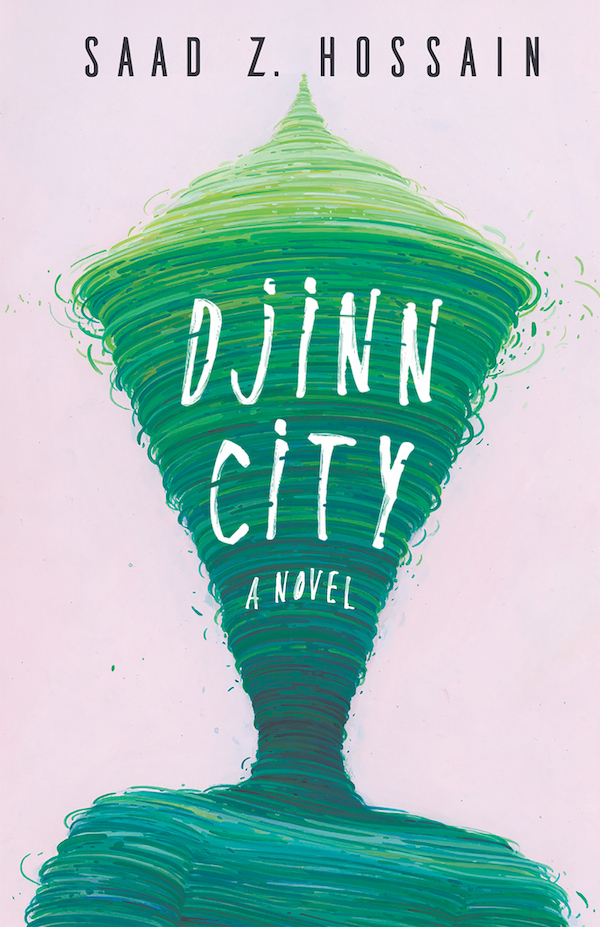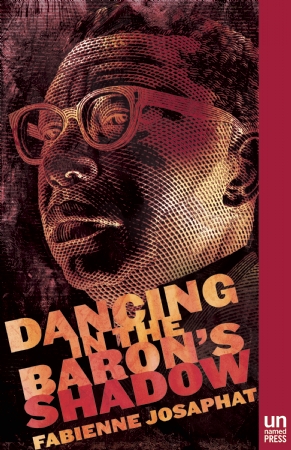
(Unnamed Press)
BY NICHOLE L. REBER
—
Saad Z. Hossain’s recently released Djinn City from Unnamed Press builds on his 2015 novel Escape from Baghdad! This Bangladeshi writer captivates with his often humorous blend of satire, sci-fi, fantasy, and mythology that takes place in 2066 underground, at ground level, and in the skies.
The novel opens with the backstory of Indelbed, a child who lives with his widower dad and a few ghostly servants in a decrepit house in Bangladesh’s capital. His father is a very learned and very drunk man, possibly because he misses the boy’s mother, and he refuses to allow his son a traditional education. Dr. Kaikobad won’t even educate his son about his own mother, other than the fact she died giving birth to him, which people love to joke about as “death by Indelbed.”
When Kaikobad falls into a coma, Aunt Juny, Uncle/Ambassador/GU Sikkim, and cousin Rais take the little guy under their wing. They initially seem to resist doing so, less so upon learning he’s related to djinns and his father is a djinn emissary.
Who/what the heck are djinns, anyway? A survey course in mythology might convey their various villainous characterizations. In Hossain’s novel, they are indeed villainous. They come in human form with a powerful aura that surrounds them and works as a weapon. It’s their human qualities that bring out Hossain’s funny, satirical encapsulation of today’s zeitgeist. They’re a litigious lot who think nothing of creating 743-page contracts, they have no allegiance with family members, and they politicize seemingly everything. Capable of becoming embroiled in frequent existentialist debates, they argue about evolution and creationism and djinn superiority over all other creatures.
Here’s an example that takes place when Rais and his mother are on the trail to figuring out how a sort of overlord evil djinn named Matteras killed Uncle/Ambassador/GU Sikkim.
“What if humans and djinns are just related species, or even just mutations of one specie?” Rais says. “Most djinn don’t believe in evolution or genetics. They wouldn’t like this at all. I mean, it might tear them apart.”
“Even the most tolerant, humanized djinn think they’re inherently better. Imagine if there was irrefutable proof that they’re just like us? I don’t think they could accept that, as a specie,” Aunt Juny responds.
These debates go on throughout the book. For instance, Matteras throws Indelbed into a labyrinthine underground murder pit of Matteras’s own creation. There rock wyrms threaten to eat the boy, who’s been there long enough to become a man, and Givaras, who’s apparently been there for at least a millennium. Givaras, a pedantic, Dr. Frankenstein type, has tried and failed in his attempts to breed various forms of creatures who are placed down there with him. Failed, we learn, means killed.
Now the rascally character, who flagellates between likeable and despisable, plans to try again– this time with Indelbed. Before he does so he says: “I will try a technique of heating your blood, essentially boiling it. The pain is going to be rather horrid; I think some of the sensations will get through despite your damaged spine. However, you should survive, which is the main thing. It’s only pain, eh?” This time Givaras succeeds. In fact, from Indelbed’s perspective, he could construe the experience as a lesson captured by that old platitude “What doesn’t kill you makes you stronger.”
Matteras’ attempt to convince the other djinn at a major conference that there’s an overpopulation of “Humes.” They’re destroying the earth, he wants other djinn to think. Continuing on with Hossain’s themes of superiority and evolution vs creationism Matteras wants to get the OK to commence massive natural disasters that will ultimately destroy the human race. “Are we to end our days in obscene couplings with jumped-up monkeys? Chosen by God, I say! Chosen by fire!” he says.
Then there’s the existential perspective of Kaikobad, the little boy’s comatose father. He is actually alive as a sort of ghost. Walking through parts of the capital city he sees “buildings winking out of sight overnight, entire streets turning to mist.” People were disappearing as well. He “saw them fade in front of his eyes, dissipating into a kind of alternate existence, or to some purgatory.”
On a final note, Hossain’s humor is just one more reason to read this book. Its light-heartedness echo the Douglas Adams’ The Hitchhiker’s Guide to the Galaxy, especially when he mentions technologies actually in use today:
“Us djinns are more free spirit antiestablishment types…We don’t go in for big government.”
“You follow Twitter?” “Follow? We’re the ones who invented it! Djinns love brevity. It’s a racial trait, I’m sure you’ve discerned.”
My only complaint is that there are too many characters to saliently keep up with. To be fair, though, that very complaint marks me as a Western reader. We aren’t used to such a high number of characters. Among subcontinental literature, however, it’s inherent.
—
Nichole L. Reber picked up a love for world lit by living in countries around the globe. She’s a nonfiction writer and her award-winning work has been in World Literature Today, Ploughshares, The Rumpus, Lunchticket, and elsewhere. Read her stories on a Chinese cult, wearing hijab in India, and getting kidnapped in Peru at http://www.nicholelreber.com/.
![[PANK]](https://pankmagazine.com/wp-content/themes/pank/assets/images/pank-logo-large.png)

